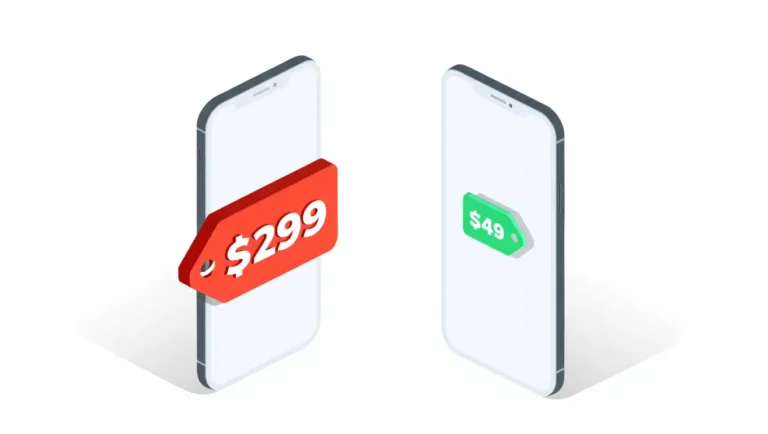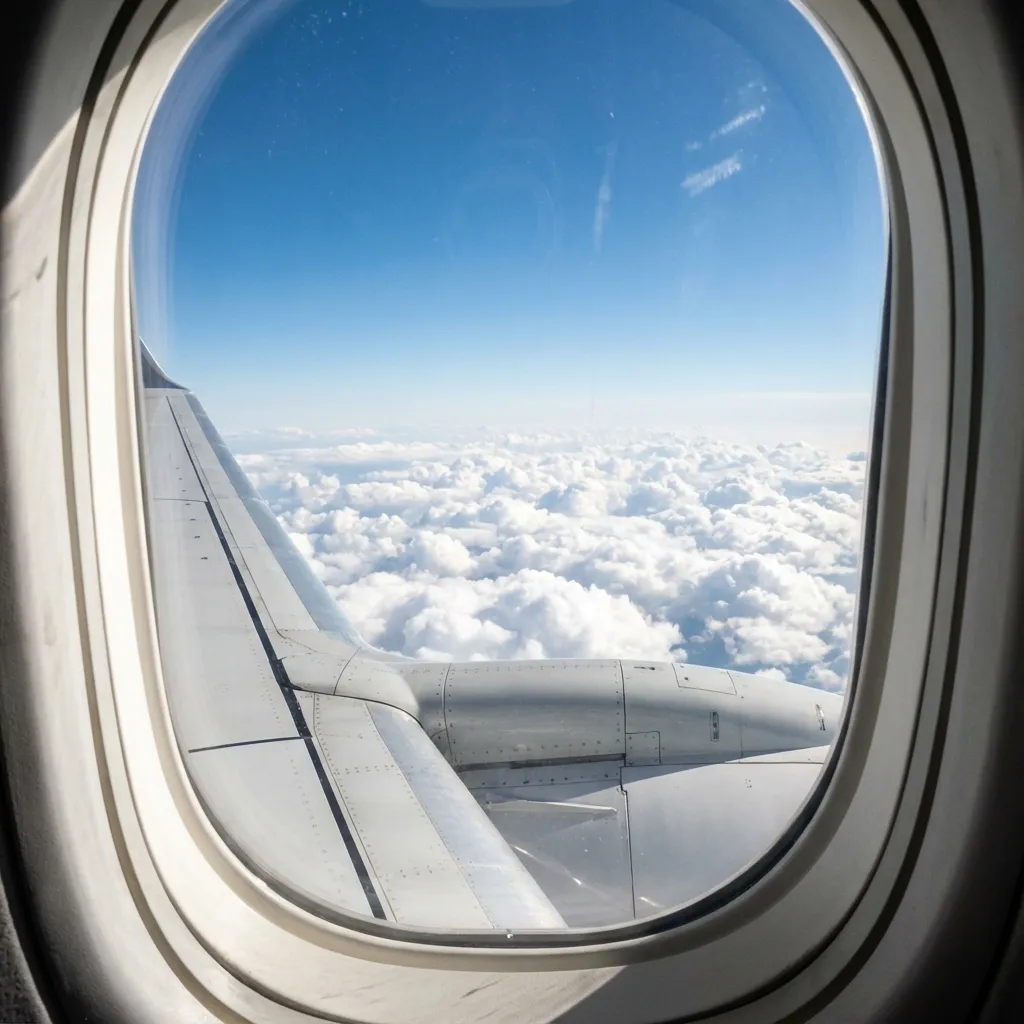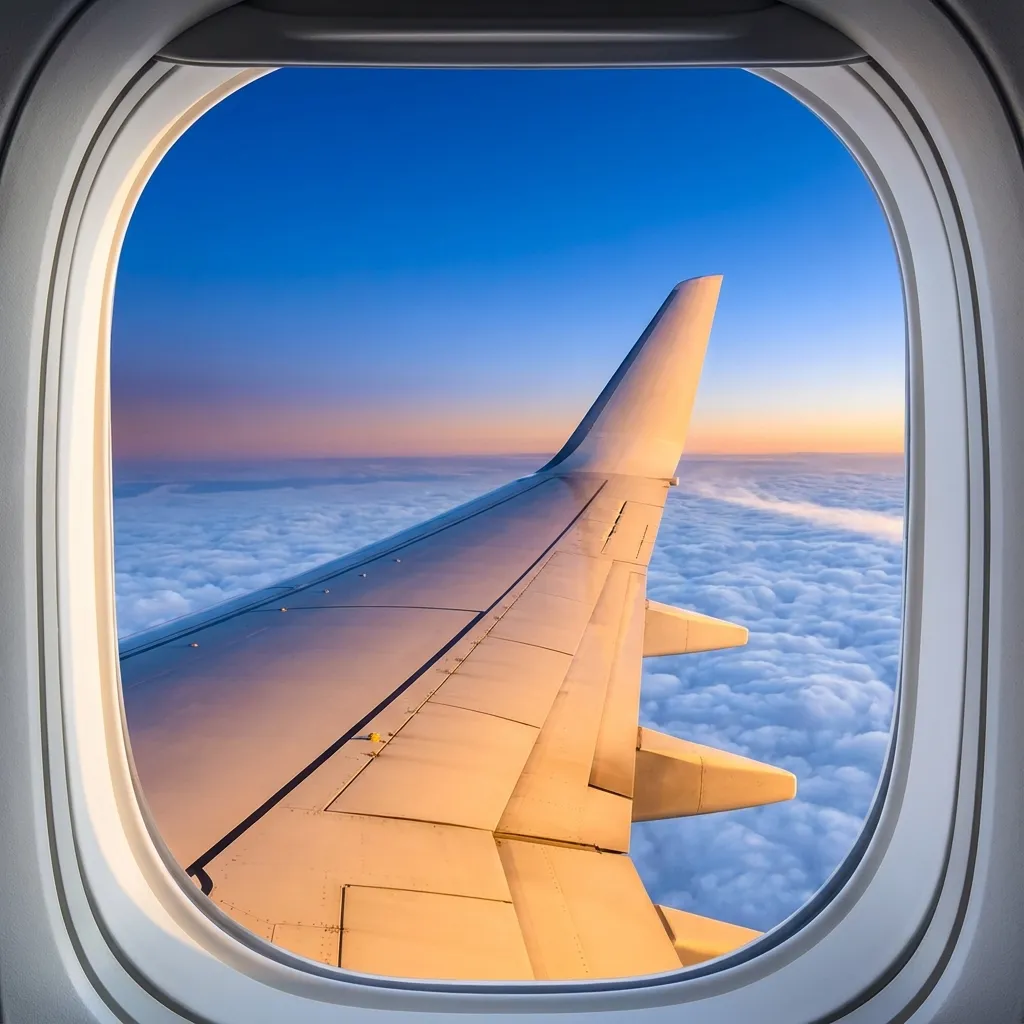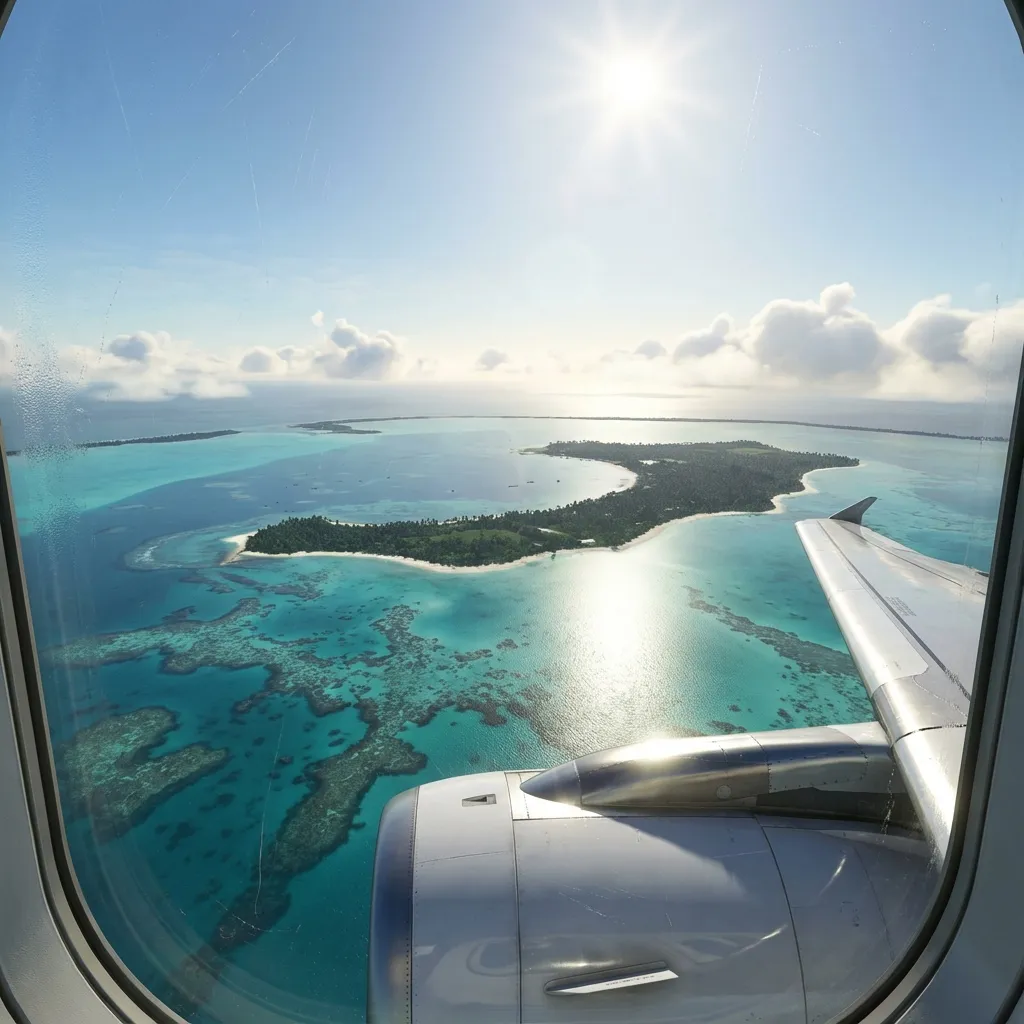There is nothing quite as painful as finding the perfect “free” business class flight using your hard-earned points, clicking through to the checkout screen, and seeing a cash co-pay of $850.
You’ve done the work. You saved the miles. Yet the airline is asking for the price of an economy ticket just to pay the “taxes and fees.”
As someone who works in IT management, I look at travel loyalty programs like complex software systems. They have rules, loopholes, and logic gates. The high fee you are seeing is usually a “carrier-imposed surcharge.” It is arguably the biggest inefficiency in the award travel ecosystem.
The good news? It’s a patchable bug. With the right routing and booking partners, you can often legally bypass these fees entirely. This guide breaks down exactly what these surcharges are and the systematic way I avoid them.
What Are Airline Fuel Surcharges (Really)?
First, let’s clear up the branding. Airlines love to call these “fuel surcharges,” implying that high oil prices force them to pass costs on to you. That is rarely the case.
The “Carrier-Imposed Surcharge” Myth
In the travel industry, these fees are often coded as YQ or YR on your ticket breakdown. While they originated decades ago when oil prices spiked, they rarely go down when oil prices drop. Today, they are simply a profit mechanism—a way for airlines to monetize loyalty members who think they are getting a free seat.
Airlines use these fees to devalue your points. If a flight costs 60,000 miles + $10 taxes, your miles are valuable. If it costs 60,000 miles + $600 surcharges, your miles are worth significantly less.
I remember trying to book a Lufthansa First Class ticket from Frankfurt a few years ago. Through Lufthansa’s own program, the fees were nearly €800. I took a step back, ran the numbers, and booked the exact same seat using LifeMiles instead. The fees dropped to under €100. Same plane, same champagne, $700 difference.
The “Good” vs. The “Bad”: Who Charges Fees?
To solve this, you need to understand the two players in every booking: the Operating Airline (who flies the plane) and the Booking Program (whose miles you use).
Some programs act as a “firewall,” blocking the operating airline from passing the fee to you. Others let the fee slip right through.
| Category | How It Works | Key Programs (The “Good Guys”) |
|---|---|---|
| The Firewalls | These programs never pass on fuel surcharges, even if the partner airline charges them. | United MileagePlus, Avianca LifeMiles, Air Canada Aeroplan |
| The Conduits | These programs pass on whatever fee the operating airline sets. If the airline charges $500, you pay $500. | British Airways Executive Club, Virgin Atlantic, ANA (sometimes) |
| The Hybrids | These programs charge fees on some partners but not others. | American Airlines AAdvantage, Alaska Airlines |
The Worst Offenders
When flying these airlines, expect high surcharges (often $200–$1,000 roundtrip) unless you use the strategies below:
- British Airways: Notorious for high fees on long-haul flights out of London.
- Lufthansa Group (Lufthansa, SWISS, Austrian): High surcharges across the Atlantic.
- Emirates: Often adds hefty carrier-imposed fees on premium cabins.
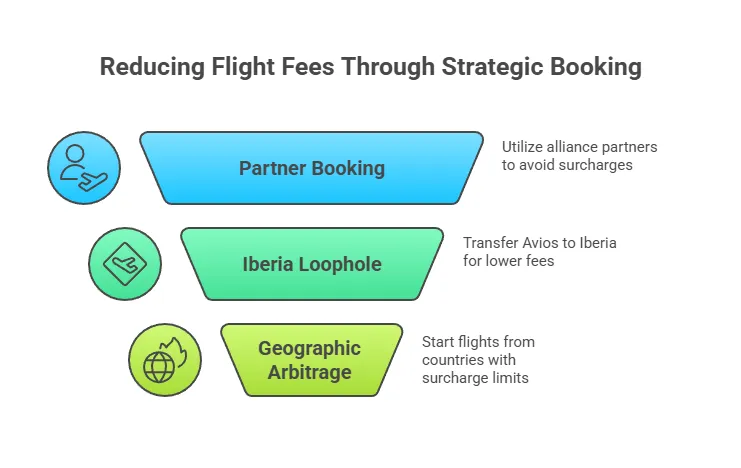
Strategy 1: The “Partner Booking” Method
This is the single most effective way to eliminate fees. You do not have to book a flight with the airline flying the plane. You can book it through their alliance partner.
If you want to fly Lufthansa (a Star Alliance member), you have options. If you book via Lufthansa Miles & More, you pay the surcharge. If you book that same Lufthansa flight using United MileagePlus miles or Avianca LifeMiles, the surcharge disappears.
United and Avianca have a policy of not passing on carrier-imposed fees. They absorb the cost or simply don’t charge it.
The Protocol:
- Find the flight availability on the operating airline (e.g., a Lufthansa flight to Munich).
- Do not transfer points to Lufthansa yet.
- Log in to a “Firewall” partner (e.g., United.com or AirCanada.com).
- Search for the exact same date and route.
- Booking through the partner will often show the taxes as ~$5.60 instead of $400+.
Strategy 2: The “Iberia Loophole” for British Airways
British Airways has some of the highest fees in the sky, often charging $800+ for a business class ticket to London. However, they share a currency (Avios) with Iberia and Aer Lingus.
You can transfer your British Airways Avios to Iberia Plus (instantly and for free). Booking a flight across the Atlantic on Iberia metal (via Madrid) often incurs a fraction of the surcharges compared to British Airways metal (via London). Even better, Aer Lingus flights booked via Avios often have extremely low fees, allowing you to clear US customs in Dublin before you land in the States.
Strategy 3: Geographic Arbitrage
Airlines cannot charge fuel surcharges if the local law forbids it. Certain countries have consumer protection laws that ban or severely limit these “junk fees” on tickets departing from their territory.
Countries That Limit Surcharges
If you route your trip to originate in these nations, you can legally bypass the fees:
- Brazil: It is illegal to charge fuel surcharges on flights departing Brazil.
- New Zealand & Australia: Highly regulated surcharges, often much lower than US/Europe equivalents.
- Hong Kong: Surcharges are regulated and capped.
- Philippines: Strictly regulated “fuel surcharge matrices” prevent arbitrary pricing.
This is particularly useful for “Round the World” trips. Instead of booking a roundtrip from London (high taxes), book a one-way to Brazil, and then a separate ticket from Brazil to your next destination.
Is It Worth Paying the Fee?
Sometimes, paying the surcharge is the mathematically correct decision. You have to calculate the Cost Per Mile (CPM).
Scenario: One-way Business Class to London.
- Option A (British Airways): 30,000 Avios + $250 Fees.
- Option B (United): 60,000 Miles + $5.60 Fees.
The Math: By paying $244.40 more in Option A, you save 30,000 miles.
$244.40 / 30,000 = 0.8 cents per mile.
Verdict: Since United miles are generally worth ~1.2 cents each, buying them back for 0.8 cents is a great deal. In this specific case, pay the surcharge to save the hard-to-earn miles.
Common Mistakes to Avoid
1. Confusing Government Taxes with Airline Fees
You cannot avoid all fees. The UK Air Passenger Duty (APD) is a government tax charged on every long-haul passenger leaving the UK. No airline program can waive this. If you fly out of London Heathrow, you will pay this tax regardless of whether you use United, British Airways, or cash. The strategies above only remove the airline’s extra profit margin (YQ), not the government’s tax.
2. Ignoring “Sweet Spot” Programs
Many travelers default to the program they know. But programs like Air Canada Aeroplan have reinvented themselves to be surcharge-friendly. Aeroplan charges no fuel surcharges on any partner airlines, making it one of the safest currencies for complex itineraries.
Methodology
The strategies in this guide are based on analyzing fare rules and “Conditions of Carriage” for major airline alliances (Star Alliance, OneWorld, SkyTeam). I utilize the ITA Matrix software to identify the specific breakdown of taxes (looking specifically for the YQ/YR subcodes) and regularly test these bookings by comparing dummy itineraries across multiple portals (e.g., searching for the same dates on United.com vs. Lufthansa.com) to verify current fee structures.
Conclusion
Airline fuel surcharges are a tax on the uninformed. They rely on the fact that most travelers will see a fee and assume it is mandatory. By treating your travel booking like a logic puzzle—choosing the right “firewall” program or leveraging geographic regulations—you can save thousands of dollars over a few years of travel.
Always check the cash co-pay before you transfer your credit card points. If it looks like a car payment, stop. Look for a partner airline, check a different route, or run the math to see if the miles saved are worth the cash spent.
Frequently Asked Questions
Which airlines have no fuel surcharges?
Airlines that typically do not add carrier-imposed surcharges to their own award tickets include United Airlines, Southwest, JetBlue, and Avianca. Additionally, booking partner flights through programs like United MileagePlus, Avianca LifeMiles, and Air Canada Aeroplan usually removes these fees from other airlines.
How can I avoid British Airways fuel surcharges?
You can minimize British Airways fees by booking their flights through partner programs like Asia Miles (Cathay Pacific) or American Airlines, which often charge lower fees than BA’s own program. Alternatively, use British Airways Avios to book flights on Aer Lingus or Iberia, which generally have much lower surcharges for crossing the Atlantic.
What is the difference between government taxes and fuel surcharges?
Government taxes (like the US September 11 Security Fee or UK Air Passenger Duty) are mandatory legal requirements that go to the government. Fuel surcharges (YQ/YR) are collected by the airline and kept as revenue. You can often avoid the airline surcharge, but you can almost never avoid the government tax.

